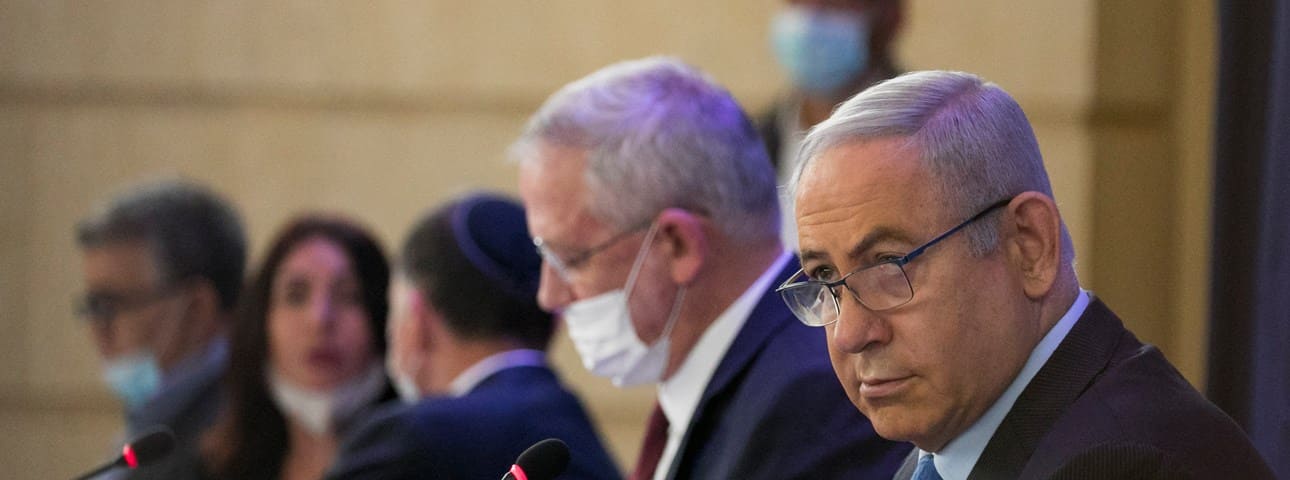Ireland Finally Has a Government!
A tale of two unity governments: The coalition agreement that formed Israel's unity government is all about forcing the parties to live up to the deal. Ireland's is all about policy.

Flash 90
The coronavirus pandemic that erupted back in early 2020 disrupted many aspects of our lives. It had the potential for obstructing the democratic process and the possibility of orderly elections. But as fate would have it, the contagion peaked at a time in which no general elections were scheduled in any established democracy. Ireland (early February) and Israel (early March) were among the last countries that beat the deadline, as it were, before restrictions and closures were imposed. This situation provides us with an opportunity to consider how the two countries are similar and how they are different.
Let’s begin with what they have in common. In both countries, the elections resulted in a hung parliament that made it difficult to form a government. In Israel, neither bloc had a clear majority in the Knesset. In Ireland, the unexpected success of the extremist Sinn Fein party led to a deadlock. In both countries, the only conceivable solution seemed to be a unity government composed of the two main parties. But for both, that option seemed to be a fantasy. In Israel, an abyss of mutual hostility lay between the Likud and Blue. In Ireland, this option would require an unprecedented alliance between two political parties whose rivalry goes back to the Irish civil war, almost a century ago, and which had never sat together in a coalition.
Nevertheless, the unbelievable happened, and unity governments were set up in both countries. There is no doubt that the COVID-19 pandemic and the economic and health crisis that came with it, played a major role in pressuring elected representatives to be more flexible, to find a way to bridge the political gulf, and to form a government that would be capable of dealing with the emergency. Another similarity between the two countries is that both found the solution in a rotation government, in which the premiership will pass from one party to the other in the course of the current parliamentary term. Whereas Israel already had experience with this model in the 1980s, no other established democracy had ever tried it.
Alongside all these similarities, however, it is important to highlight the major differences between the two unity governments – differences that lay bare the inherent flaws of the Netanyahu-Gantz rotation government. Consider, for example, the two coalition agreements: In Ireland this is a document of 120 pages that details the new government’s plans on a wide range of issues, ranging from rebooting the economy, through universal health insurance, and on to a Green “New Deal” for protecting the environment. Only at its end are there three concise pages on how the coalition will function and the ministerial portfolios will be allocated, including a mechanism for the rotation of the premiership. In Israel, by contrast, almost the entire document deals with personal issues and enumerates various and strange reciprocal guarantees to ensure that the two sides will live up to the agreement. Only a few awkward paragraphs deal with substance; even the document enumerating the government’s fundamental guidelines (a bit over one page long!) seems amateurish, as if written offhandedly.
Moreover, in Ireland the historic agreement did not necessitate changing a single word in the country’s constitution. In Israel, by contrast, establishment of the rotation government required destroying and vandalizing our Basic Laws, trampling on basic norms of governance in a hasty and superficial process, and without any serious discussion of the implications of these changes for our system of government and for Israeli democracy. The icing on the cake is the shamefully bloated Government that was established. With this government of 34 ministers, Israeli politicians’ lack of self-awareness has reached new heights. In Ireland, the new Government manages with only 15 ministers—the maximum allowed by the country’s constitution. A brief reminder: we too had a statutory limit of 19 ministers. But whereas the Irish constitution cannot be easily amended, our Basic Laws are fragile and frail. The limitation on the number of ministers was abolished with one fell swoop, along with all the other “amendments” to the Basic Laws.
So we should be somewhat envious of a country that has a strong constitution, stable rules to which the system adheres, and a political culture in which the elected representatives debate values and programs, not personal recognition and prestige. All this, without a single word about the situation of incumbent prime minister who is standing trial on three serious counts of corruption.
The article was published in Times of Israel.
